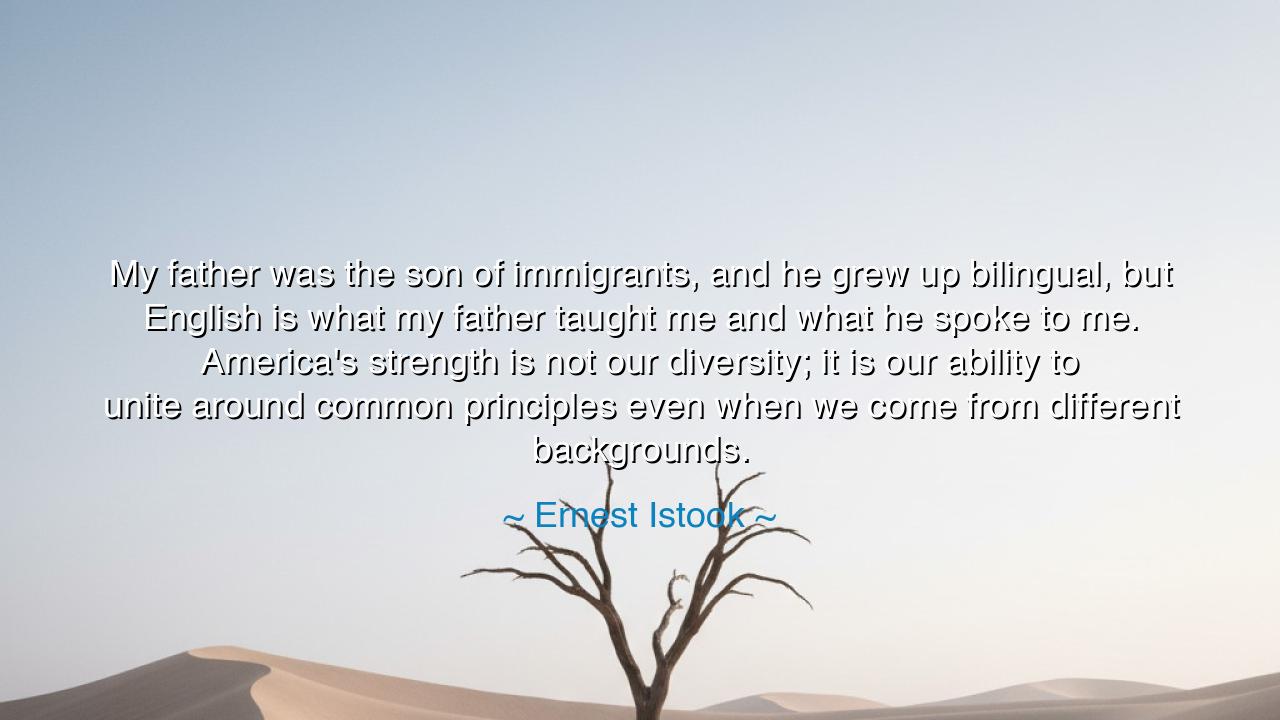
My father was the son of immigrants, and he grew up bilingual
My father was the son of immigrants, and he grew up bilingual, but English is what my father taught me and what he spoke to me. America's strength is not our diversity; it is our ability to unite around common principles even when we come from different backgrounds.






"My father was the son of immigrants, and he grew up bilingual, but English is what my father taught me and what he spoke to me. America's strength is not our diversity; it is our ability to unite around common principles even when we come from different backgrounds." These are the words of Ernest Istook, an American statesman, who spoke of the foundations that bind a people together. His words shine with the wisdom of heritage and the truth of nationhood: that the greatness of a land is not merely in its differences, but in its power to weave those differences into one enduring fabric.
The ancients taught that a house divided cannot stand, and a kingdom torn by faction crumbles into dust. Diversity, though a source of color and strength, must be held together by shared belief, by shared vision, by the principles that rise above blood and tongue. Istook’s reflection is born of personal memory: his father, a child of immigrants, carried the wealth of two languages, yet chose to teach his son the language that bound him to the larger nation. This was not a rejection of heritage, but an affirmation of unity—the recognition that identity finds its truest strength when it joins itself to a greater whole.
Consider the story of Abraham Lincoln, who led a divided people through civil war. America was a land of many voices, many tongues, many customs. Yet Lincoln knew that survival required more than tolerance—it required union around higher truths. In his Gettysburg Address, he called the nation back to its principles: liberty, equality, and government of the people. It was not diversity alone that saved the nation, but the ability of diverse peoples to unite around these shared ideals. His words echoed the eternal teaching: a people must be bound not merely by circumstance, but by conviction.
Istook’s quote reminds us that immigration has always been part of the American story. Families came from every corner of the earth, bearing their languages, their customs, their sorrows, and their hopes. But what gave these multitudes strength was not simply their difference—it was their commitment to become one people, under one set of guiding principles. From the Irish laborer to the Italian mason, from the Polish farmer to the Chinese railway worker, each contributed threads of their culture. Yet the tapestry held together because there was a loom—a shared belief in liberty, opportunity, and responsibility.
The danger arises when differences become walls rather than bridges. History warns us of empires that fractured when tribes clung to their separateness more than their unity. The Roman Empire, though mighty, faltered when its provinces ceased to share in the spirit of Rome. In contrast, the strength of nations endures when people from many backgrounds recognize themselves as part of a greater destiny. To be bilingual, to be diverse, to honor one’s heritage—these are noble. But nobler still is the ability to unite around principles that safeguard all people, principles that lift us beyond what divides.
The lesson here is profound: do not mistake unity for uniformity. We need not erase our roots, nor abandon the stories of our fathers. But like Istook’s father, we must also pass on the language and principles that bind us to the larger community. The true strength of America, or of any people, is not found in how different we are, but in how steadfastly we uphold the values that let difference coexist in peace.
Practically, this means cherishing your own heritage while also embracing the responsibilities of citizenship. Teach your children both where they come from and what principles they must live by. Speak gratitude for the freedoms you enjoy, and defend the values that make them possible. Remember that unity is not given—it is chosen daily, in the way you speak, the way you serve, and the way you honor both your ancestors and your neighbors.
So pass down Istook’s words as a reminder: “America’s strength is not our diversity; it is our ability to unite around common principles.” For in this lies the secret of all enduring nations: that while we may come from many lands, we walk together toward one destiny. And when your children ask why so many tongues and peoples can live side by side, tell them: “Because we are bound by something greater than difference—we are bound by the strength of shared principles.”






AAdministratorAdministrator
Welcome, honored guests. Please leave a comment, we will respond soon